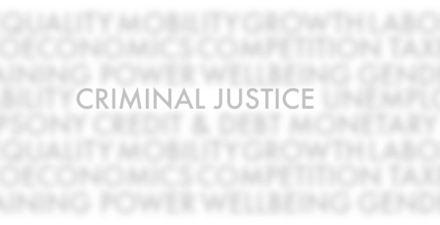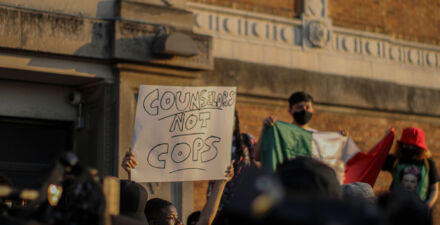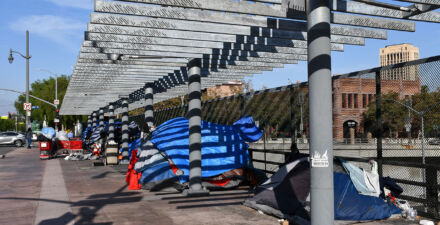How government reliance on fines and fees harms communities across the United States

This column is the fourth in a series by guest authors examining systemic racial, ethnic, and gender inequities in the U.S. economy and in access to government social infrastructure and income support programs—inequities that hinder the full growth potential of our economy and the well-being of our society.
Whether it’s a traffic ticket for rolling through a stop sign, or forgetting to signal before a turn, most people reading this will have had at least one experience with government-imposed fines and fees. For a wealthy person, paying a $100 traffic fine plus hundreds of dollars more in added fees may be a slight inconvenience, but if you are one of the 64 percent of U.S. consumers living paycheck-to-paycheck, that same ticketing fine and those hundreds in added fees could mean you are no longer able to afford rent or feed your family.
In the scenario above, that initial traffic fine and fees would appear on the same ticket, which misleads many to believe the two are interchangeable monetary sanctions. But there is a big difference between a fine and a fee—and that distinction has huge implications for how we understand their impacts.
A fine is a financial punishment for a civil or criminal offense. Some examples of common fines include those for traffic violations, littering, and cracked windshields. But fees—or alternatively “costs” or “assessments” or “surcharges”—are simply hidden taxes; their sole purpose is to raise revenue for governments. And governments charge fees at multiple points of interaction with the criminal justice system. They can be attached to everything from minor traffic tickets, to ‘free’ public defenders, and even to emergency medical care in jail.
Fees can quickly snowball into hundreds of dollars, even thousands of dollars, in court debt for people who come into contact with the criminal justice system. Those who can’t afford to pay these exorbitant fees risk a suspended driver’s license, arrest, and jail. Low-income communities and people of color are disproportionately impacted by court debt, but anyone who misses just one fee payment can be trapped in a cycle of debt and punishment.
How jurisdictions across the nation became increasingly reliant on fines and fees
Beginning in the 1980s, state and local governments increased the amount of fines and fees imposed on people convicted of traffic and municipal code violations, misdemeanors, and felonies in an effort to generate revenue. During that same period, the federal government also cut the total amount of financial assistance to local governments from 22 percent to approximately 6 percent of city budgets.
While federal funding decreased in the 1980s, the criminal legal system also began to grow exponentially. Following changes in sentencing laws and policies, state and local governments spent more money arresting, prosecuting, and incarcerating more than ever before. State spending on corrections increased from $6.7 billion in 1985 to $56.6 billion in 2019.
State and local jurisdictions deepened their reliance on fees particularly during times of fiscal stress, such as in 2008 and 2009 during and immediately after the Great Recession. They introduced new fees and increased the amount charged for fees in an ill-fated attempt to fill budget gaps. A 2019 analysis of fine and fee revenue rates found that in 600 jurisdictions across the nation, fines and forfeitures accounted for more than 10 percent of the general fund, and “in at least 284 of those governments [was] more than 20 percent.”
Government reliance on fines and fees exacerbates racial disparities and makes communities less safe
After a police officer killed Michael Brown in 2014, the U.S. Department of Justice began an investigation of the Ferguson Police Department. Their investigation found that the FPD was engaged in aggressive, racially discriminatory policing practices incentivized by the city’s dependence on the criminal legal system to raise revenue. Specifically, the report found that despite only making up 67 percent of the population, Black people accounted for 85 percent of FPD’s traffic stops, 90 percent of its citations, and 93 percent of its arrests from 2012 to 2014. By 2015, the city planned to collect more than 23 percent of its revenue through fines and fees.
Unfortunately, racially discriminatory policing practices driven by governments’ reliance on fines and fees isn’t just a Ferguson problem. A study in Nevada found that while Black people made up approximately 13 percent of the population of Las Vegas, nearly 45 percent of all arrest warrants issued for failure to pay a traffic ticket were issued against Black people.
Police acting as armed debt collectors does not make communities safer. Instead, this practice exposes people of color to more interactions with law enforcement. When this happens, routine traffic stops can become deadly, as in the cases of Samuel DuBose and Philando Castile.
Samuel DuBose, an unarmed Black man, was shot and killed by Cincinnati police during a traffic stop for an allegedly broken tail light. He had previously been stopped multiple times for driving on a suspended license, for which he accumulated many unpaid fines and fees.
Philando Castile was pulled over by police in Minneapolis-St. Paul, Minnesota at least 46 times, almost all for minor non-safety-related violations, and issued more than 80 citations. Even after half were dismissed, he still owed more than $6,000 in fines and fees, leading to multiple driver’s license suspensions. The 47th time he was pulled over, a police officer shot and killed him.
When police are directed to collect fines and fees, public safety goals can be supplanted by revenue goals. A study analyzing revenue data and crime reporting data from 5,935 municipalities found that increased reliance on fines and fees correlates with unresolved violent crime and unresolved property crime.
Another recent study of the impact of New Mexico’s fines and fees found that the pressure to pay fine and fee debt can drive people toward high-risk behavior, undermining community safety. Nearly half of respondents in the study reported resorting to “payday” loans—that is, short-term, high-interest loans, usually due on their next payday—or other exploitative loan options to pay fines and fees. Additionally, 41 percent of respondents indicated they had, at some point, committed a crime to get money to pay court-ordered fines and fees.
The imposition of fines and fees on working families, coupled by the egregious practices used to collect these court debts, systematically strips wealth and well-being from impacted communities. The result of this wealth extraction is that working families are often forced to forgo healthcare, food, and other basic needs in an ill-fated attempt to pay down the debt. With inflation continuing to rise and the federal minimum wage not moving to meet rising costs, low-income families need to use all of their financial resources to survive.
States and localities have the power to end fees and decriminalize poverty
In New York, my home state, the most egregious fee is the mandatory surcharge attached to every conviction, including minor infractions and traffic tickets. Courts do not waive or reduce these kinds of surcharges — or even consider your ability to pay them. Depending on the type of conviction, a single mandatory surcharge can amount to hundreds of dollars.
Perhaps a few hundred dollars may not seem like much, but this cost is enormous to the nearly 60 percent of New Yorkers who do not earn a living wage. As one New Yorker noted in a video about New York’s predatory court fees, “I had to make a choice: do we make sure our granddaughter doesn’t get caught in the system or do we pay our bills?”
In New York, a $455 court fine or fee is equivalent to two weeks’ worth of groceries for a mother and her two children. Where is this mom supposed to come up with that money without sacrificing basic needs? For New Yorkers that are struggling to make ends meet and pay down court debt, this impossible choice is one they must face nearly every day.
Right now in New York, I have the privilege of serving as one of the leaders of No Price on Justice, a coalition of impacted community leaders, advocates, public defenders, and policymakers working to pass the End Predatory Court Fees Act. This bill would eliminate the mandatory surcharge and probation fees, and end incarceration and commissary garnishment for an inability to pay fines and fees. It would also end the mandatory minimum fines that currently do not allow for judges to consider a person’s economic circumstances when assessing a fine.
In the fight to end fees in the justice system, New York does not stand alone. We stand together with a growing national movement working to end the criminalization of poverty. In January 2023, the Fines and Fees Justice Center together with Americans for Prosperity and the American Civil Liberties Union, launched End Justice Fees, the first national campaign dedicated to ending fees in the justice system and discharging their associated debt.
In recent years, dozens of states and localities in states both red and blue have enacted reforms to eliminate one or more fees. Oklahoma, Louisiana, Texas, and several other states have recently eliminated some or all fees charged to youth in the juvenile system. A growing number of states and localities also are taking steps to eliminate electronic monitoring fees, probation and parole fees, counsel fees, and the many other fees imposed on people at all levels of the justice system. With successive laws in 2020, 2021, and 2022, California has enacted some of the most far-reaching reforms to date—eliminating 40 fees, including probation, parole, and local booking fees, and discharging over $16.5 billion in court debt.
Nationwide calls to end these unjust fees are also backed by widespread support among U.S. voters from all demographic groups. A recent nationwide poll released by the Fines and Fees Justice Center finds that 62 percent of voters favor fee elimination.
It’s time for our leaders to recognize the dangers inherent in relying on fines and fees to fund governments, and work towards ending fees and restoring families’ ability to thrive.
—Antonya Jeffrey is the New York state director for the Fines and Fees Justice Center
Are you interested in being part of the movement to end justice fees in your state? Want to learn more about our work in New York? Please contact us at info@fineandfeesjusticenter.org




